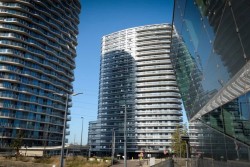Reaching Net Zero carbon targets by 2050 presents the construction industry with immense challenges. There is a tendency to ‘kick the carbon can down the road’ and not address emissions, particularly in these extraordinary times, but the sector must make changes and material selection is a good place to start. Here Heath Hindmarch Chairman of PSP Architectural, considers the benefits of aluminium in helping to meet environmental expectations.
Timber is often portrayed as the most sustainable of building materials but when it comes to external elements – Building Regulations and safety concerns, mean there are many barriers to timber specification. Often referred to as a ‘green metal’ – the sustainability benefits of Aluminium are not truly understood. Aluminium is arguably the most sustainable and recyclable building material and is also highly regarded for its aesthetic qualities.
Aluminium is a lightweight, high strength material and because of these unique properties it is used in virtually every aspect of the modern construction industry. From patio doors in homes to curtain walling on the tallest towers. It is easy to handle which reduces the environmental impact and cost or transportation. It can be bent or shaped into innumerable designs providing architects with endless design possibilities.
Aluminium is also very durable and highly resistant to rust and corrosion caused by modern industrial pollutants and requires very little long term maintenance. Aluminium can also be used as a structural reinforcement or as an alternative to replace concrete and timber exterior cladding and batten systems, which can enhance the appearance of a building. The life span of aluminium products is measured in decades rather than years.
Perhaps the most significant benefit of using aluminium lies with its recyclable and sustainable possibilities. Around 75% of all aluminium produced remains in circulation and can be melted and reused without any impact on its mechanical properties, which means aluminium products can be manufactured over and over again to the same high standard. The energy used in the primary production of aluminium is not lost, because it is stored in the products and ‘reactivated’ during recycling. The energy use of recycling is up to 95% lower when compared to the primary aluminium production.
Whilst there are a number of steps that must be taken to achieve Net Zero emissions in the construction industry, considering a material such as aluminium could make a significant impact. If the industry wants to reduce its carbon footprint, then harnessing the benefits of a lightweight and sustainable material will contribute towards reducing harmful carbon emissions whilst enhancing aesthetic appeal.
Environmental policies quite rightly focus in the main on sustainability and the recyclable credentials of building materials are often overlooked. We are well aware of the environmental factors involved and that these credentials are set to play an increasingly larger role in the industry as we head towards 2050.
Over the last 20 years we have developed a vast knowledge and deep understanding of what the right solutions are for each building. Experience is everything and we feel that maintaining practical capability throughout the whole design and manufacturing processes enhances the complete client experience.
Building on the history and experience of PSP Architectural, in 2014 we launched PSP Aluminium, allowing us to provide a totally integrated facade system for the external envelope of any building.
Working from our 25,000ft2 premises utilising state-of-the-art CNC fabrication equipment, PSP Aluminium specialise in the manufacture of curtain walling, windows and doors to the highest quality and reliability levels.
We also manufacture a range of rainscreen cladding systems which have been tested by the Centre for Window & Cladding Technology (CWCT) to ensure the systems meet rigorous industry standards and are resilient to extreme weather conditions. There are various material choices including solid and anodised aluminium which are classified as non-combustible materials and other aluminium alternatives such as pre-coated which is classified as A1 fire rated and post powder coated classified A2 fire rated.
The quality of our products and services are subject to our Quality Management System which run in accordance with ISO 9001:2015. PSP strive for excellence in the quality of our manufactured goods which stems directly from understanding our customers’ needs. This is enhanced by the use of our centralised ERP system which allows for full traceability in line with the requirements of the ‘Golden Thread’ recommended in the Hackitt report.
To find out more about PSP Architectural and PSP Aluminium, the company’s design and manufacturing capabilities together with their extensive range of products and services go to: www.pspuk.com









